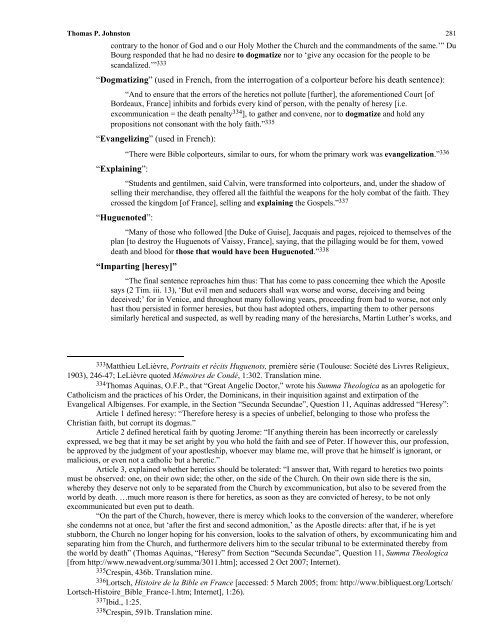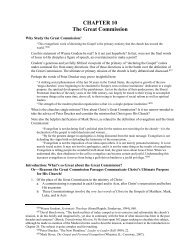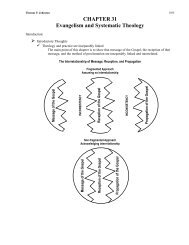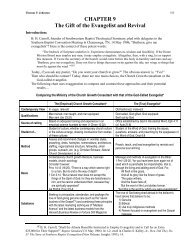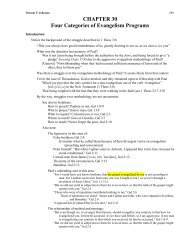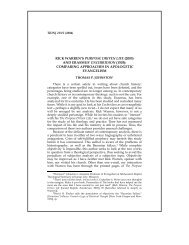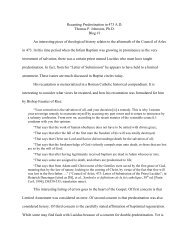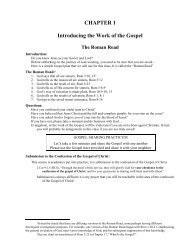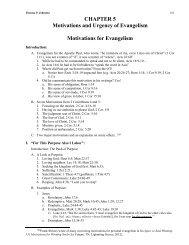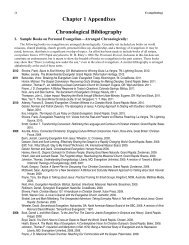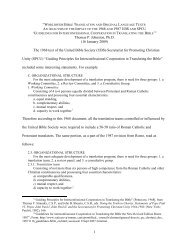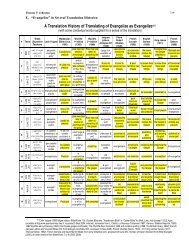CHAPTER 7 Defining Evangelizing - Evangelism Unlimited
CHAPTER 7 Defining Evangelizing - Evangelism Unlimited
CHAPTER 7 Defining Evangelizing - Evangelism Unlimited
Create successful ePaper yourself
Turn your PDF publications into a flip-book with our unique Google optimized e-Paper software.
Thomas P. Johnston 281<br />
contrary to the honor of God and o our Holy Mother the Church and the commandments of the same.’” Du<br />
Bourg responded that he had no desire to dogmatize nor to ‘give any occasion for the people to be<br />
scandalized.’” 333<br />
“Dogmatizing” (used in French, from the interrogation of a colporteur before his death sentence):<br />
“And to ensure that the errors of the heretics not pollute [further], the aforementioned Court [of<br />
Bordeaux, France] inhibits and forbids every kind of person, with the penalty of heresy [i.e.<br />
excommunication = the death penalty 334 ], to gather and convene, nor to dogmatize and hold any<br />
propositions not consonant with the holy faith.” 335<br />
“<strong>Evangelizing</strong>” (used in French):<br />
“There were Bible colporteurs, similar to ours, for whom the primary work was evangelization.” 336<br />
“Explaining”:<br />
“Students and gentilmen, said Calvin, were transformed into colporteurs, and, under the shadow of<br />
selling their merchandise, they offered all the faithful the weapons for the holy combat of the faith. They<br />
crossed the kingdom [of France], selling and explaining the Gospels.” 337<br />
“Huguenoted”:<br />
“Many of those who followed [the Duke of Guise], Jacquais and pages, rejoiced to themselves of the<br />
plan [to destroy the Huguenots of Vaissy, France], saying, that the pillaging would be for them, vowed<br />
death and blood for those that would have been Huguenoted.” 338<br />
“Imparting [heresy]”<br />
“The final sentence reproaches him thus: That has come to pass concerning thee which the Apostle<br />
says (2 Tim. iii. 13), ‘But evil men and seducers shall wax worse and worse, deceiving and being<br />
deceived;’ for in Venice, and throughout many following years, proceeding from bad to worse, not only<br />
hast thou persisted in former heresies, but thou hast adopted others, imparting them to other persons<br />
similarly heretical and suspected, as well by reading many of the heresiarchs, Martin Luther’s works, and<br />
333Matthieu LeLièvre, Portraits et récits Huguenots, première série (Toulouse: Société des Livres Religieux,<br />
1903), 246-47; LeLièvre quoted Mémoires de Condé, 1:302. Translation mine.<br />
334Thomas Aquinas, O.F.P., that “Great Angelic Doctor,” wrote his Summa Theologica as an apologetic for<br />
Catholicism and the practices of his Order, the Dominicans, in their inquisition against and extirpation of the<br />
Evangelical Albigenses. For example, in the Section “Secunda Secundae”, Question 11, Aquinas addressed “Heresy”:<br />
Article 1 defined heresy: “Therefore heresy is a species of unbelief, belonging to those who profess the<br />
Christian faith, but corrupt its dogmas.”<br />
Article 2 defined heretical faith by quoting Jerome: “If anything therein has been incorrectly or carelessly<br />
expressed, we beg that it may be set aright by you who hold the faith and see of Peter. If however this, our profession,<br />
be approved by the judgment of your apostleship, whoever may blame me, will prove that he himself is ignorant, or<br />
malicious, or even not a catholic but a heretic.”<br />
Article 3, explained whether heretics should be tolerated: “I answer that, With regard to heretics two points<br />
must be observed: one, on their own side; the other, on the side of the Church. On their own side there is the sin,<br />
whereby they deserve not only to be separated from the Church by excommunication, but also to be severed from the<br />
world by death. …much more reason is there for heretics, as soon as they are convicted of heresy, to be not only<br />
excommunicated but even put to death.<br />
“On the part of the Church, however, there is mercy which looks to the conversion of the wanderer, wherefore<br />
she condemns not at once, but ‘after the first and second admonition,’ as the Apostle directs: after that, if he is yet<br />
stubborn, the Church no longer hoping for his conversion, looks to the salvation of others, by excommunicating him and<br />
separating him from the Church, and furthermore delivers him to the secular tribunal to be exterminated thereby from<br />
the world by death” (Thomas Aquinas, “Heresy” from Section “Secunda Secundae”, Question 11, Summa Theologica<br />
[from http://www.newadvent.org/summa/3011.htm]; accessed 2 Oct 2007; Internet).<br />
335Crespin, 436b. Translation mine.<br />
336Lortsch, Histoire de la Bible en France [accessed: 5 March 2005; from: http://www.bibliquest.org/Lortsch/<br />
Lortsch-Histoire_Bible_France-1.htm; Internet], 1:26).<br />
337Ibid., 1:25.<br />
338Crespin, 591b. Translation mine.


